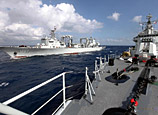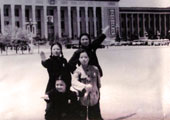
Renminbi becomes popular as more offshore centers take shape
The Chinese mainland is turning to more partners around the world to launch the next phase of yuan internationalization, with each partner selected to play a role.
After Hong Kong was given an eight-year head start as an offshore business center for the yuan, recent developments in the use of the currency in Singapore, Taiwan and London have been "very encouraging", said Peng Xingyun, a researcher and financial specialist at the Chinese Academy of Social Sciences.
These developments may indicate a rising recognition of the currency worldwide, he said.
They also reflect Chinese monetary authorities' accelerating pace of expanding offshore renminbi hubs while moving toward the currency's convertibility for the capital account and forging ahead with domestic financial reform, he said.
Nathan Chow, an economist at DBS Bank Ltd, said, "Market confidence in accepting renminbi for trade settlement will increase. In turn, this will encourage more participation from corporations and banks, potentially increasing the range of renminbi investment products."
Chow said Singapore will serve as a gateway to Southeast Asia, while Taiwan is expected to become a local hub for yuan settlement and trading.
Hong Kong's dominant role will remain, and the emergence of new offshore centers will expand the existing regime instead of creating competing systems, he said.
The People's Bank of China, the central bank, approved the Singapore branch of the Industrial and Commercial Bank of China on Feb 8 as the clearing bank in Singapore, which indicates the city state will become the third offshore yuan center after Hong Kong and Taiwan.
Ravi Menon, managing director of the Monetary Authority of Singapore, said the appointment marks a "milestone" and enables Singapore's financial center to play a useful role in facilitating greater use of the yuan.
The announcement came two days after Taiwan's banks started accepting deposits and conducting interbank trading in yuan. The People's Bank of China announced earlier that the Bank of China's Taipei branch will serve as the yuan-clearing bank on the island.
The yuan will quickly become a trade invoicing currency in Asia as the three offshore yuan centers are all in industrialized economies, the Australia and New Zealand Banking Group said in a research note. It added that South Korea has recently allowed its commercial banks to tap into the yuan swap arrangement, and Japan was able to conduct yuan trading in June.

















 At 75, he travelled in Europe; at 98, he got a master's degree; at 102, he published an autobiography.
At 75, he travelled in Europe; at 98, he got a master's degree; at 102, he published an autobiography.


![]()
